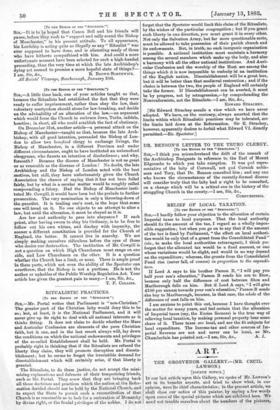[TO THE EDITOR OF THE " SPECTATOR. " ]
So.,—A little time back, one of your articles taught us that, because the Ritualists had established the fact that they were ready to suffer imprisonment, rather than obey the law, their voluntary martyrdom should atone for law-breaking, and decide on the advisability of an alteration of the law,—an argument which would force the Church to embrace Jews, Turks, infidels, heretics ; in short, all who could establish the fact of obstinacy.
On December 31st, another article—a personal attack on the Bishop of Manchester—taught us that, because the late Arch-- bishop, with all good intention, persuaded the Bishop of Lon- don to allow two beneficed clergy to exchange livings, the Bishop of Manchester, in a different Province and under different circumstances, ought to have instituted an unbeneficed clergyman, who flaunts an intention of disobedience ; and why,
forsooth Because the diocese of Manchester is not as great or as venerable as the diocease of London ! No doubt, the late Archbishop and the Bishop of London acted with the best motives, but still, they have unfortunately given the Church Association the chance of saying that it has not been foiled fairly, but by what in a secular matter would be roughly called compounding a felony. Had the Bishop of Manchester insti- tuted Mr. Cowgill, it would have been but the prelude to further prosecution. The very nomination is only a throwing-down of the gauntlet. It is trailing one's coat, in the hope that some one will tread on it. No one objects to an attempt to alter a law, but until the alteration, it must be obeyed as it is.
Are law and authority to pass into abeyance ? If each priest, after having sworn to obey his Ordinary, is to be free to follow out his own whims, and disobey with impunity, the sooner a different constitution is provided for the Church of England, the better. It cannot live in anarchy. We are simply making ourselves ridiculous before the eyes of those who desire our destruction. The institution of Mr. Cowgill is not a question on which High Churchmen must range on one side, and Low Churchmen on the other. It is a question whether the Church has a limit, or none. There is ample proof in these parts, which not even the ability of the Spectator can overthrow, that the Bishop is not a partisan. He is not the author or upholder of the Public Worship Regulation Act. Your article has given the greatest pain to many.—I am, Sir, &c., T. F. COLLINS.


































 Previous page
Previous page